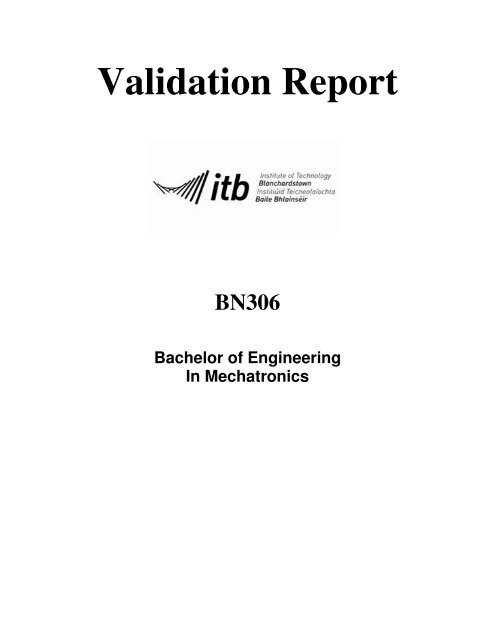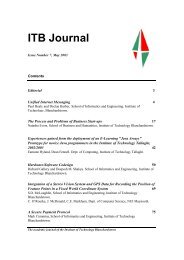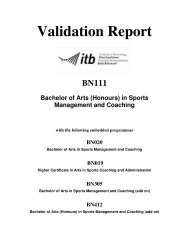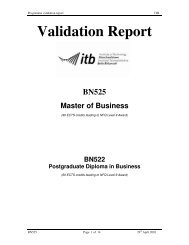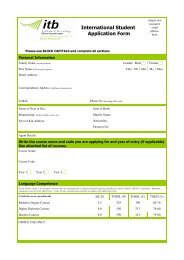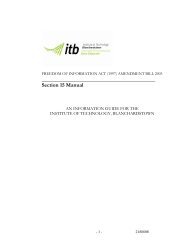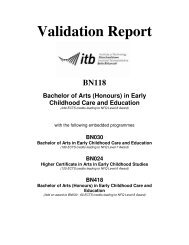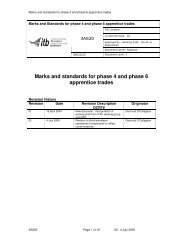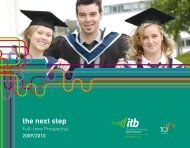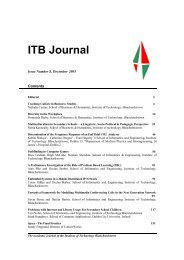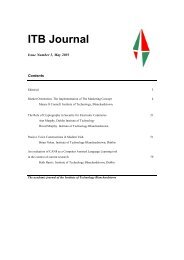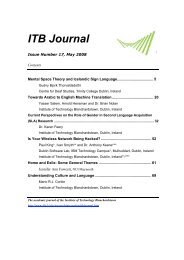Validation Report BN306 - Institute of Technology Blanchardstown
Validation Report BN306 - Institute of Technology Blanchardstown
Validation Report BN306 - Institute of Technology Blanchardstown
You also want an ePaper? Increase the reach of your titles
YUMPU automatically turns print PDFs into web optimized ePapers that Google loves.
<strong>Validation</strong> <strong>Report</strong><br />
<strong>BN306</strong><br />
Bachelor <strong>of</strong> Engineering<br />
In Mechatronics
Programme validation report<br />
ITB<br />
Introduction<br />
The mission <strong>of</strong> the <strong>Institute</strong> is to serve its students and the community by<br />
meeting the skills needs in the economy and increasing the level <strong>of</strong> participation<br />
in third-level education and training, particularly in Dublin North-West and its<br />
environs.<br />
The <strong>Institute</strong> in 2006 was awarded delegated authority enabling the<br />
development, validation, implementation and continuous improvement <strong>of</strong> its<br />
existing taught higher education and training programmes up to and including<br />
level 9 <strong>of</strong> the National Framework <strong>of</strong> Qualifications.<br />
The purpose <strong>of</strong> this document is to report on the findings <strong>of</strong> the peer review panel<br />
established to validate this proposed programme against the criteria for the<br />
validation <strong>of</strong> programmes as stipulated in the <strong>Institute</strong> policy document 2MP01 I .<br />
This submission by the School <strong>of</strong> Informatics and Engineering evolved through:<br />
• examining the competence, expertise and experience <strong>of</strong> it’s staff in<br />
addition to the strategy <strong>of</strong> the department/school/<strong>Institute</strong> and government<br />
educational policy<br />
• identifying through research the need for and the preferred structure and<br />
characteristics <strong>of</strong> the proposed programme<br />
I 2MP01 Design, validation and accreditation <strong>of</strong> new academic programmes<br />
<strong>BN306</strong> Page - 1 - <strong>of</strong> 12 28 th April 2008
Programme validation report<br />
ITB<br />
Programme overview<br />
The Bachelor <strong>of</strong> Engineering in Mechatronics is a two year part-time conversion<br />
programme. This programme is targeted towards those working in related<br />
industry who have already achieved the award <strong>of</strong> Higher Certificate in<br />
Engineering (Electronics/Manufacturing) or a NFQ I level 6 equivalent, who wish<br />
to upskill to an Ordinary Degree in Mechatronics, NFQ level 7.<br />
Mechatronics is the synergistic combination <strong>of</strong> mechanical engineering,<br />
electronic engineering and s<strong>of</strong>tware engineering. The purpose <strong>of</strong> this<br />
interdisciplinary engineering field is the study <strong>of</strong> automata from an engineering<br />
perspective and serves the purposes <strong>of</strong> controlling advanced hybrid systems.<br />
The word itself is a portmanteau <strong>of</strong> 'Mechanics' and 'Electronics'.<br />
To provide a comprehensive coverage <strong>of</strong> the fundamental concepts, knowledge<br />
and supporting practical skills the academic content <strong>of</strong> this programme has been<br />
structured into the following six key areas:<br />
• Electronic-specific Technologies<br />
• Mechanics and Materials<br />
• Information <strong>Technology</strong><br />
• Design and Development<br />
• Mathematics<br />
• Engineering Support <strong>of</strong> Mechatronics<br />
The Engineering Support stream comprises <strong>of</strong> physics/engineering<br />
science, personal development, engineering drawing, ECAD II and quality<br />
systems.<br />
There is a strong emphasis within the syllabus on quality, testing and<br />
maintenance issues in a manufacturing environment in which automation plays a<br />
significant role.<br />
The programme will be delivered online as a part-time programme with students<br />
expected to attend the IT <strong>Blanchardstown</strong> campus one Saturday morning in<br />
three, allowing them to complete a range <strong>of</strong> laboratory and tutorial sessions while<br />
also giving them time to interact with staff and meet their peers.<br />
This programme is intended to consolidate and integrate both practical and<br />
analytical skills with knowledge previously gained to make a graduate <strong>of</strong> this<br />
programme <strong>of</strong> immediate value to industry.<br />
I National Framework <strong>of</strong> Qualifications<br />
II Electronic Computer Aided Design<br />
<strong>BN306</strong> Page - 2 - <strong>of</strong> 12 28 th April 2008
Programme validation report<br />
ITB<br />
Programme detail<br />
Programme title<br />
Award title<br />
Award type<br />
Bachelor <strong>of</strong> Engineering in Mechatronics<br />
Bachelor <strong>of</strong> Engineering<br />
Major – Add on<br />
NFQ I level 7<br />
ECTS II credits 60<br />
Programme code<br />
Banner code<br />
<strong>BN306</strong><br />
BN_EMECC_D<br />
Panel members<br />
Chairperson<br />
Panel member 1<br />
Panel member 2<br />
Panel member 3<br />
Dr. Annie Doona<br />
Dun Laoghaire <strong>Institute</strong> <strong>of</strong> Art, Design and<br />
<strong>Technology</strong><br />
Dr. Pat Phelan<br />
University <strong>of</strong> Limerick<br />
Mr. Matt Cotterell<br />
Cork <strong>Institute</strong> <strong>of</strong> <strong>Technology</strong><br />
Mr. Mark Pentony<br />
Hewlett-Packard<br />
In attendance<br />
Dr. Diarmuid O’Callaghan<br />
IT <strong>Blanchardstown</strong><br />
Mr. Michael Keane<br />
IT <strong>Blanchardstown</strong><br />
Date <strong>of</strong> Panel Meeting Friday 25 th April 2008<br />
I National Framework <strong>of</strong> Qualifications<br />
II European Credit Transfer and Accumulation System<br />
<strong>BN306</strong> Page - 3 - <strong>of</strong> 12 28 th April 2008
Programme validation report<br />
ITB<br />
<strong>Institute</strong> staff present<br />
Session I<br />
Meeting with Director, Head <strong>of</strong> School & Head <strong>of</strong> Department<br />
Dr. Mary Meaney<br />
Mr. Larry McNutt<br />
Mr. Richard Gallery<br />
Director<br />
Head <strong>of</strong> School <strong>of</strong> Informatics & Engineering<br />
Head <strong>of</strong> Department <strong>of</strong> Engineering<br />
Session II<br />
Head <strong>of</strong> School, Head <strong>of</strong> Department & Programme Leader(s)<br />
Mr. Larry McNutt<br />
Mr. Richard Gallery<br />
Mr. Niall Campbell<br />
Head <strong>of</strong> School <strong>of</strong> Informatics & Engineering<br />
Head <strong>of</strong> Department <strong>of</strong> Engineering<br />
Department <strong>of</strong> Engineering<br />
Session III Meeting with programme design staff<br />
Mr. Larry McNutt<br />
Mr. Richard Gallery<br />
Mr. Cormac MacMahon<br />
Mr. Raymond Manley<br />
Mr. Fergus Maughan<br />
Mr. Niall Campbell<br />
Dr. Darren Lavelle<br />
Mr. Daniel McSweeney<br />
Mr. Derek Kerr<br />
Mr. John Massey<br />
Mr. Niall Bell<br />
<strong>BN306</strong> Page - 4 - <strong>of</strong> 12 28 th April 2008
Programme validation report<br />
ITB<br />
Panel findings<br />
Section I<br />
In evaluating the appropriateness, quality and proposed operation <strong>of</strong> this<br />
programme the following criteria has been considered and is hereby reported<br />
upon:<br />
Strategic planning<br />
The panel was satisfied that the programme is in keeping with the <strong>Institute</strong>’s<br />
mission, that it does not constitute redundant provision and that it makes<br />
efficient use <strong>of</strong> resources.<br />
Evidence <strong>of</strong> consultation<br />
Through discussion with <strong>Institute</strong> staff, the panel found that a comprehensive<br />
research effort was undertaken to validate the need for, and the preferred<br />
structure and characteristics <strong>of</strong> the proposed programme.<br />
Feedback from the following companies was presented to the panel:<br />
• IBM<br />
• Cully Automation<br />
• Gerrard Laboratories<br />
Rationale<br />
IT <strong>Blanchardstown</strong> recognises that Mechatronics education in Ireland is a crucial<br />
contributor to the continued competitiveness <strong>of</strong> the high technology sector <strong>of</strong> the<br />
Irish economy and that the associated skills set is in demand by both national<br />
and international companies who require personnel with mechatronics expertise<br />
to help ensure that the products they manufacture are up-to-date and can be<br />
produced economically.<br />
IT <strong>Blanchardstown</strong> also recognises that a large pool <strong>of</strong> students exist, working in<br />
local, related industry who have already achieved the award <strong>of</strong> Higher Certificate<br />
in Engineering (Electronics/Manufacturing) or a NFQ level 6 equivalent, who<br />
wish to upskill to an Ordinary Degree in Mechatronics, NFQ level 7.<br />
<strong>BN306</strong> Page - 5 - <strong>of</strong> 12 28 th April 2008
Programme validation report<br />
ITB<br />
Learner employment potential<br />
Mechatronics is a field with a future, exciting career opportunities and a huge<br />
range <strong>of</strong> applications. Mechatronic systems are at the forefront <strong>of</strong> technological<br />
developments. Transport, healthcare, service, automotive and entertainment and<br />
just a few <strong>of</strong> the sectors that are benefiting from developments in Mechatronics.<br />
These sectors are looking for graduates that have a broader engineering<br />
background including Electronic and Mechanical and IT skills.<br />
Protection <strong>of</strong> learners<br />
Section 43 <strong>of</strong> the Act I does not apply.<br />
Quality assurance<br />
The panel was informed <strong>of</strong> how the submission had been developed and<br />
approved internally whilst complying with the <strong>Institute</strong>’s quality assurance policies<br />
and procedures. The panel concurred that said policies and procedures had<br />
been applied to the development <strong>of</strong> the proposed programme.<br />
Programme titles and award titles<br />
Following discussion, the panel was satisfied that the title <strong>of</strong> the proposed<br />
programme is clear, accurate and fit for the purpose <strong>of</strong> informing prospective<br />
learners and other stakeholders and consistent with HETAC II award titles.<br />
Ethics<br />
The panel was satisfied that the <strong>Institute</strong> has internal policies and procedures in<br />
place to ensure that all teaching, learning or research activity across the<br />
spectrum <strong>of</strong> NFQ levels is conducted / delivered in a manner that is both morally<br />
and pr<strong>of</strong>essionally ethical.<br />
I Qualifications (Education and Training) Act, 1999<br />
II Higher Education and Training Awards Council<br />
<strong>BN306</strong> Page - 6 - <strong>of</strong> 12 28 th April 2008
Programme validation report<br />
ITB<br />
Section II<br />
In evaluating this programme the following specific aspects have been<br />
considered and are hereby reported upon:<br />
Unity<br />
The panel found that the programme design is consistent with HETAC’s policy on<br />
Accumulation <strong>of</strong> Credits and Certification <strong>of</strong> Subjects, that it has an underlying<br />
unifying theme with modules bonded by linkages being either implicit or explicit. It<br />
was also clear to the panel how the standards <strong>of</strong> knowledge, skill and<br />
competence evolve throughout the programme as a whole.<br />
Teaching and learning<br />
The panel discussed with staff <strong>of</strong> the <strong>Institute</strong> the various modes <strong>of</strong> interaction<br />
practised with learners. Evidence <strong>of</strong> a clear dialogue was confirmed, enabling<br />
learners to develop and have available to them the support <strong>of</strong> academic staff.<br />
In a presentation given by the e-learning co-ordinator the panel learned that IT<br />
<strong>Blanchardstown</strong> possesses a broad range <strong>of</strong> knowledge and expertise in the<br />
area <strong>of</strong> learner support and course delivery technologies. A demonstration was<br />
also given <strong>of</strong> ITB’s online classroom tool facilitating the delivery <strong>of</strong> online lectures<br />
and meetings. The panel also heard how this will be the <strong>Institute</strong>’s first<br />
programme aiming to deliver live lecture content to distance students using the<br />
internet. The panel commended the interdepartmental co-operation, effort and<br />
pr<strong>of</strong>essionalism <strong>of</strong> the design team on this new initiative.<br />
A tour <strong>of</strong> the facilities included a fully operational Manufacturing <strong>Technology</strong><br />
Workshop used for teaching and the demonstration <strong>of</strong> engineering production<br />
techniques in addition to nine laboratory facilities dedicated to engineering<br />
science and electronic and computer engineering elements <strong>of</strong> mechatronic<br />
programmes.<br />
<strong>BN306</strong> Page - 7 - <strong>of</strong> 12 28 th April 2008
Programme validation report<br />
ITB<br />
Course management arrangements were discussed and deemed adequate,<br />
these included:<br />
survey <strong>of</strong> students by lecturer<br />
summary <strong>of</strong> survey <strong>of</strong> students by lecturer<br />
survey <strong>of</strong> students by department<br />
course boards<br />
The panel was satisfied with the proposed resource plan for the necessary<br />
staffing levels and were suitably impressed with the qualifications, experience,<br />
competence and commended the obvious enthusiasm <strong>of</strong> the staff concerned.<br />
Minimum entry requirements<br />
It was noted by the panel that this programme is primarily targeted towards<br />
students with a Higher Certificate in a discipline other than mechatronics. The<br />
panel felt that entry requirements for the various potential cohorts <strong>of</strong> applicants<br />
for admission to the programme required further clarification.<br />
<strong>BN306</strong> Page - 8 - <strong>of</strong> 12 28 th April 2008
Programme validation report<br />
ITB<br />
Learner assessment<br />
Through discussion with the design team, and from the submission document<br />
itself it was explained in detail to the panel the multiple modes <strong>of</strong> assessment,<br />
both formal and informal that will be employed. The panel heard how IT<br />
<strong>Blanchardstown</strong>’s policy on continuous assessment is based on the objective <strong>of</strong><br />
developing/enhancing the students’ application <strong>of</strong> knowledge, aptitude for critical<br />
analysis and problem solving within specific timeframes. Assessment procedures<br />
include a combination <strong>of</strong> tests, assignments, reports, projects, presentations and<br />
seminars. The panel also heard how online assessment would also be used. The<br />
scale <strong>of</strong> learner assessment was deemed by the panel to be appropriate for the<br />
proposed programme.<br />
Standards <strong>of</strong> knowledge, skill and competence<br />
The panel felt having reviewed the syllabi and assessment methods that learners<br />
would be capable <strong>of</strong> attaining the standards <strong>of</strong> knowledge, skill or competence<br />
relevant for this award.<br />
Access, transfer and progression<br />
The programme incorporates the established procedures for access, transfer and<br />
progression while accommodating a variety <strong>of</strong> access and entry requirements<br />
from applicants with expertise in related disciplines.<br />
<strong>BN306</strong> Page - 9 - <strong>of</strong> 12 28 th April 2008
Programme validation report<br />
ITB<br />
Decision <strong>of</strong> the panel<br />
The panel recommended the validation <strong>of</strong> the proposed programme namely:<br />
Programme title<br />
Award title<br />
Award type<br />
Bachelor <strong>of</strong> Engineering in Mechatronics<br />
Bachelor <strong>of</strong> Engineering<br />
Major – Add on<br />
NFQ level 7<br />
ECTS credits 60<br />
Programme code<br />
Banner code<br />
<strong>BN306</strong><br />
BN_EMECC_D<br />
Panel conditions<br />
This validation is subject to the following condition:<br />
To allay any confusion that may arise during admission to the programme the<br />
panel has requested that the minimum entry requirements be clearly articulated<br />
for each <strong>of</strong> the different potential cohorts <strong>of</strong> students specifying any necessary<br />
bridging modules as appropriate. This is to include:<br />
• Type and level <strong>of</strong> award <strong>of</strong> previous appropriate qualifications<br />
• Essential skill sets required clearly defined as a pre-requisite<br />
• Protocol for determining chosen elective in Semester 1<br />
<strong>BN306</strong> Page - 10 - <strong>of</strong> 12 28 th April 2008
Programme validation report<br />
ITB<br />
Panel recommendations<br />
The following specific recommendations were made:<br />
1) Review the content and terminology <strong>of</strong> the learning outcomes to ensure<br />
consistency and equity throughout the submission document. The panel<br />
also felt that the following needed to be made more explicit in the<br />
learning outcomes:<br />
• Communication skills<br />
• Ethical and pr<strong>of</strong>essional practices<br />
2) Consider the inclusion <strong>of</strong> energy and environmental control in the<br />
programme content.<br />
3) Stipulate access to laboratory resources and required s<strong>of</strong>tware for the<br />
on-line learner.<br />
4) Consider removing the “Fluid Power System” module, defining same as a<br />
pre-entry bridging module and re-assigning the 5 credits possibly to the<br />
project or include an “Industrial Engineering” module in its place.<br />
5) Consider the equity <strong>of</strong> credits between this programme and other<br />
programmes with regard to the work load involved in the completion <strong>of</strong><br />
the project and the learning outcomes to be gained.<br />
6) Update and standardise bibliographies with additional inclusion <strong>of</strong> online<br />
resources.<br />
7) Review the module syllabi to ensure that no pre-requisites exist between<br />
sequential odd and even semesters.<br />
8) Make other technical and minor amendments as discussed at the panel<br />
meeting.<br />
<strong>BN306</strong> Page - 11 - <strong>of</strong> 12 28 th April 2008
Programme validation report<br />
ITB<br />
Panel observations<br />
The panel commended and congratulated the design team on this initiative to<br />
identify, address and respond to industry needs both locally and nationally. They<br />
concurred on the wide range <strong>of</strong> skills a graduate <strong>of</strong> this programme seeking<br />
employment would require and felt that these were well reflected in the<br />
programme. The panel also commended the willingness <strong>of</strong> <strong>Institute</strong> staff present<br />
to engage in open and frank dialog through which their obvious enthusiasm for<br />
the new programme became evident.<br />
Panel signatures<br />
Chairperson<br />
Dr. Annie Doona _____________________ Date __________<br />
Secretary<br />
Dr. Diarmuid O’Callaghan _____________________<br />
Date __________<br />
<strong>BN306</strong> Page - 12 - <strong>of</strong> 12 28 th April 2008


